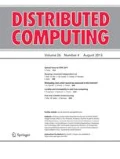Abstract
We consider deterministic distributed broadcasting on multiple access channels in the framework of adversarial queuing. Packets are injected dynamically by an adversary that is constrained by the injection rate and the number of packets that may be injected simultaneously; the latter we call burstiness. A protocol is stable when the number of packets in queues at the stations stays bounded. The maximum injection rate that a protocol can handle in a stable manner is called the throughput of the protocol. We consider adversaries of injection rate 1, that is, of one packet per round, to address the question if the maximum throughput 1 can be achieved, and if so then with what quality of service. We develop a protocol that achieves throughput 1 for any number of stations against leaky-bucket adversaries. The protocol has \({\mathcal{O}(n^2+\text{burstiness})}\) packets queued simultaneously at any time, where n is the number of stations; this upper bound is proved to be best possible. A protocol is called fair when each packet is eventually broadcast. We show that no protocol can be both stable and fair for a system of at least two stations against leaky-bucket adversaries. We study in detail small systems of exactly two and three stations against window adversaries to exhibit differences in quality of broadcast among classes of protocols. A protocol is said to have fair latency if the waiting time of packets is \({\mathcal{O}(\text{burstiness})}\). For two stations, we show that fair latency can be achieved by a full sensing protocol, while there is no stable acknowledgment based protocol. For three stations, we show that fair latency can be achieved by a general protocol, while no full sensing protocol can be stable. Finally, we show that protocols that either are fair or do not have the queue sizes affect the order of transmissions cannot be stable in systems of at least four stations against window adversaries.
Similar content being viewed by others
References
Abramson N.: Development of the alohanet. IEEE Trans. Inf. Theory 31, 119–123 (1985)
Aiello W., Kushilevitz E., Ostrovsky R., Rosén A.: Adaptive packet routing for bursty adversarial traffic. J. Comput. Syst. Sci. 60, 482–509 (2000)
Alvarez C., Blesa M., Serna M.: A characterization of universal stability in the adversarial queuing model. SIAM J. Comput. 34, 41–66 (2004)
Andrews M., Awerbuch B., Fernández A., Leighton T., Liu Z., Kleinberg J.: Universal-stability results and performance bounds for greedy contention-resolution protocols. J. ACM 48, 39–69 (2001)
Bender, M.A., Farach-Colton, M., He, S., Kuszmaul, B.C., Leiserson, C.E.: Adversarial contention resolution for simple channels. In: Proceedings of the 17th ACM Symposium on Parallelism in Algorithms and Architectures (SPAA), pp. 325–332 (2005)
Bhattacharjee R., Goel A., Lotker Z.: Instability of FIFO at arbitrary low rates in the adversarial queuing model. SIAM J. Comput. 34, 318–332 (2004)
Borodin A., Kleinberg J.M., Raghavan P., Sudan M., Williamson D.P.: Adversarial queuing theory. J. ACM 48, 13–38 (2001)
Chlebus B.S., Gołąab K., Kowalski D.R.: Broadcasting spanning forests on a multiple access channel. Theory Comput. Syst. 36, 711–733 (2003)
Chlebus B.S., Kowalski D.R., Lingas A.: Performing work in broadcast networks. Dist. Comput. 18, 435–451 (2006)
Chlebus, B.S., Kowalski, D.R., Rokicki, M.A.: Adversarial stability of multiple access channels, submitted to a journal. A preliminary version appeared as Adversarial queuing on the multiple access channel. In: Proceedings of the 25th ACM Symposium on Principles of Distributed Computing (PODC), pp. 92–101 (2006)
Gallager R.G.: A perspective on multiaccess channels. IEEE Trans. Inf. Theory 31, 124–142 (1985)
Gamarnik D.: Stability of adaptive and nonadaptive packet routing policies in adversarial queueing networks. SIAM J. Comput. 32, 371–385 (2003)
Goldberg L.A., Jerrum M., Kannan S., Paterson M.: A bound on the capacity of backoff and acknowledgement-based protocols. SIAM J. Comput. 33, 313–331 (2004)
Goldberg L.A., MacKenzie P., Paterson M., Srinivasan A.: Contention resolution with constant expected delay. J. ACM 47, 1048–1096 (2000)
Håstad J., Leighton T., Rogoff B.: Analysis of backoff protocols for multiple access channels. SIAM J. Comput. 25, 740–774 (1996)
Koukopoulos D., Mavronicolas M., Nikoletseas S.E., Spirakis P.G.: The impact of network structure on the stability of greedy protocols. Theory Comput. Syst. 38, 425–460 (2005)
Lotker Z., Patt-Shamir B., Rosén A.: New stability results for adversarial queuing. SIAM J. Comput. 33, 286–303 (2004)
Lynch N.A.: Distributed Algorithms. Morgan Kaufmann, San Fransisco (1996)
Metcalfe R.M., Boggs D.R.: Ethernet: distributed packet switching for local computer networks. Commun. ACM 19, 395–404 (1976)
Mitzenmacher M., Upfal E.: Probability and Computing. Cambridge University Press, London (2005)
Raghavan P., Upfal E.: Stochastic contention resolution with short delays. SIAM J. Comput. 28, 709–719 (1998)
Ribenboim P.: The New Book of Prime Number Records, 3rd edn. Springer, Heidelberg (1995)
Rosén A.: A note on models for non-probabilistic analysis of packet switching networks. Inf. Process. Lett. 84, 237–240 (2002)
Author information
Authors and Affiliations
Corresponding author
Additional information
The results of this paper appeared in a preliminary form in ‘Stability of multiple access channels under maximum broadcast loads’ in Proceedings of the 9th International Symposium on Stabilization, Safety, and Security of Distributed Systems (SSS), 14–16 November 2007, Paris, France, Springer LNCS 4838, pp. 124–138, and also partly in ‘Adversarial queuing on the multiple access channel’ in Proceedings of the 25th ACM Symposium on Principles of Distributed Computing (PODC), 23–26 July 2006, Denver, Colorado, USA, pp. 92–101.
The work of D. R. Kowalski and M. A. Rokicki was supported by the Engineering and Physical Sciences Research Council Grant EP/G023018/1.
The work of M. A. Rokicki was partly done while he was a doctoral student at the University of Colorado Denver and next a post-doctoral fellow at the Centre National de la Recherche Scientifique, Université Paris Sud.
Rights and permissions
About this article
Cite this article
Chlebus, B.S., Kowalski, D.R. & Rokicki, M.A. Maximum throughput of multiple access channels in adversarial environments. Distrib. Comput. 22, 93–116 (2009). https://doi.org/10.1007/s00446-009-0086-4
Received:
Accepted:
Published:
Issue Date:
DOI: https://doi.org/10.1007/s00446-009-0086-4




